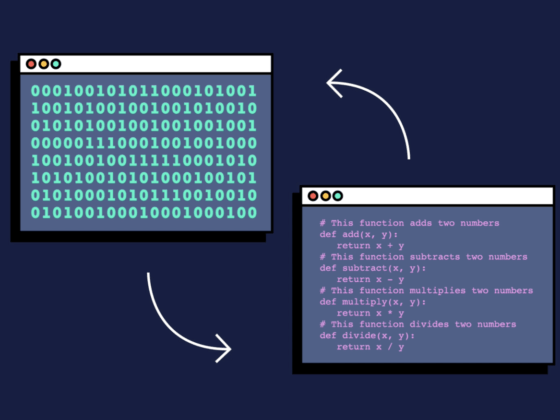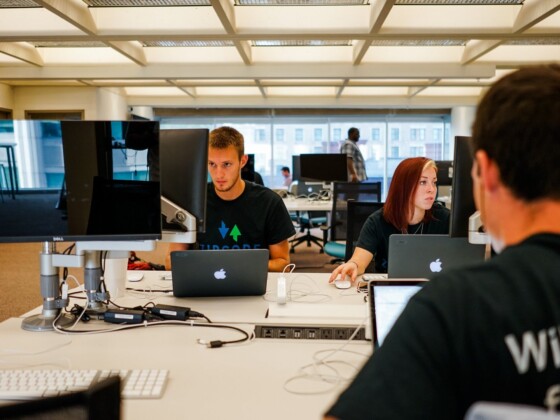Thinking of joining the tech industry as an IT professional but discouraged by the tuition costs and time required to complete a degree? Then an IT bootcamp might be the shortcut you’re looking for. Coding bootcamps are very popular, even more so among people who already have careers and would like to change them. Here are a few things you need to know about them.
What is a coding bootcamp?
Top coding bootcamps are a great alternative for people who’d like to get into IT but don’t have the patience or money needed for a college degree. A bootcamp is a short and very intensive program that lasts for 16 weeks on average and teaches students the basics of coding. Obviously, bootcamps vary in terms of how demanding the curriculum is, what exactly you get to study there, and how helpful they are. But if you do your research and manage to find a good one, the knowledge and skills you’ll get there might actually be more valuable than what you’d study in school.
The main benefit of bootcamps is that, unlike a computer science or cybersecurity degree, they only teach the things you actually need to get into coding. There are no useless courses that leave students wondering what their purpose is. The assignments you’re given in a coding bootcamp are practice-oriented and relevant to your chosen specialization. Basically, a decent developer bootcamp is what college students would love their programs to look like. Keep in mind, though, that completing a programming bootcamp is no joke. It’s challenging, and only the most motivated students succeed. So before you enroll, answer the following five questions to make sure you’re ready.
Do you really want to code?
If you’re thinking of joining a coding bootcamp and paying quite a lot of money for it (since good bootcamps are rarely cheap), make sure that coding is really for you. Otherwise, you’ll hardly be able to deal with the pressure that the bootcamp curriculum puts on you. So, here is the list of the main pros and cons of becoming a coder:
- Pro #1: Income
One of the things about being a software engineer or other computer science specialist that attracts so many people is the pay. The average salary of a coder is quite modest, about $60,000. But if you stick to the industry for a while and gain experience, you can expect to make as much as $150,000 and beyond.
- Pro #2: Flexibility
Another reason to consider a career change and choose coding as your next career path is the flexibility that being a coder provides. First, most tech companies encourage their employees to work remotely, which is perfect for anyone who has gotten used to the freedom of working from one’s home during the pandemic. Also, as a coder, you can find a job basically anywhere. For example, you can move to Portugal without needing to learn Portuguese (at least at first).
- Pro #3: No need for a college degree
Finally, as you already know by now, you don’t really need to go to college to become a coder. So you can save quite a bit of time and money. Most bootcamps aren’t free, but they still cost less than a degree. And if you’re lucky, you can find a great yet cheap coding bootcamp.
- Con #1: High chances of social isolation
If you’re an extrovert who enjoys working in a team, coding might not be for you. Sure, you may have team-based tasks every once in a while. But for the most part, a coder spends their working hours on their own.
- Con #2: Repetitive tasks (at least at the beginning of your career)
You’ll hardly get to choose what tasks to work on as a beginner. And those assigned to you for the first few months or so might not be too creative or inspiring. Prepare yourself for a long career journey.
- Con #3: A very fast-paced industry
Finally, the tech industry is notoriously fast-paced. As a would-be part of it, you need to be ready to keep growing professionally and expanding your skill set throughout your career. Otherwise, your competencies might soon become obsolete.
Are you ready to commit?
What stops a lot of people who’d like to enroll in a coding camp is the time commitment it implies. While bootcamps take much less time than a college degree, they are also very intensive. It’s like a full-time job with homework on top. So if you expect to be able to study at a full-time bootcamp while still maintaining your regular nine-to-five job, forget it. As long as you have 24 hours in a day the same way all of us do, you won’t be able to do both. But it’s also perfectly understandable that you might not be able to leave your job because you depend on the income it provides.
A part time coding bootcamp is a great solution. Sure, it will last longer than its full-time counterpart, so you can expect your coding education to take at least 24 weeks or so. However, since the pace is much slower, you won’t have to quit your current job, limit the time you spend with your friends and family or neglect your regular daily routines. What’s more, as part-time bootcamps are less intensive, they do not put students under as much pressure, so you’re at a lower risk of burning out before you even start your career in IT.
Also, if there’s no bootcamp where you live, consider finding the best online coding bootcamp and joining it instead. First, it’ll eliminate the commute time, thus adding an hour or two to your day. You’ll get to spend them relaxing, enjoying time with your loved ones, or studying. Also, if you enroll in an online bootcamp, you’ll get to study in the well-familiar and comfortable environment of your own home. As a result, you’ll probably feel less stressed compared to how you would feel if you attended your coding classes in person. Online bootcamps are in no way inferior. Your education won’t suffer if you decide to join one.
What do you want to do in IT?
The IT industry is already vast, and it keeps expanding by the year. So it’s not enough to merely decide that you’d like to code for a living. You need to choose what exactly it is you want to do. Otherwise, you won’t be able to find the coding camp that best suits your interests and career aspirations. It’s impossible to list every IT specialization here, but here are a few popular options to consider:
- Cloud computing
Largely because of the COVID-19 pandemic, more and more companies have been moving their enterprise systems to the cloud. The trend is expected to continue in the foreseeable future, so if you choose cloud computing as your field, you won’t have any problems finding a job.
- Security
Security is yet another rapidly-growing field within the IT industry, and is one of the more demanding yet well-compensated specializations. So if you aren’t discouraged by challenges and would like to avoid easy, repetitive tasks, security is for you.
- Application development
App development has been one of the fastest-growing IT specializations over the past few years, and it won’t lose its popularity any time soon. As an app developer, you can also expect diverse, exciting tasks and an impressive salary.
- Business analytics
Business analytics is a little different from the rest of the specializations on this list because it doesn’t necessarily involve coding. It is the perfect choice for you if you love working with data yet are a little intimidated by coding as such. Not every tech bootcamp offers a business analysis program, but some do.
If you are still struggling to decide which path within the IT world you want to follow, consider taking the “What IT profession is best for you?” quiz. It will help you choose the right specialization based on your interests, personality, and expectations (including your preference for an office or remote job).
Does your personality match the career you’ve chosen?
A full stack bootcamp is an awesome way to learn the hard skills needed to become a coder, but it can’t teach you everything. The thing is, to be a successful IT professional, you need to learn not only the tech side of the job, but also have the necessary soft skills most recruiters and hiring managers are looking for. For example, you can’t really achieve much unless you have outstanding self-organization skills. IT implies tons of independent work, so you need to learn how to avoid procrastination and do a lot in a short amount of time.
Also, contrary to popular belief, communication skills and the ability to be a team player are big for an IT specialist. If you struggle with either verbal or written communication, you might need to up your skills a bit. Also, no matter how exceptional a professional you are, you need to be able to delegate and ask for help when necessary. Otherwise, you’re at risk of burning out after a year or so in the IT field. Consider reading a book or two that can help you work on your soft skills, such as Think Again. The Power of Knowing What You Don’t Know by Adam Grant and Scrum: The Art of Doing Twice the Work in Half the Time by Jeff Sutherland.
But first, learn whether you have it in you to become a successful IT professional by taking the “Can I be a coder?” quiz. No matter the results, though, don’t be discouraged. Look at them as a roadmap for your future development. After all, just like hard skills, soft skills can and should be learned. As long as you’re willing to work on yourself, you’re going to be fine in any industry and in any career.
Are you ready to start over?
Finally, think of everything you need to learn and all the efforts that’ll go into your career change and try to answer the question of whether or not you’re ready to start over. If you already have a career, you’ve probably spent years getting to where you are now. The same is true for a career change, especially a drastic one. You may be an esteemed professional who enjoys the respect and trust of colleagues. You probably also have enough autonomy because your management is aware that you know what you’re doing.
Sadly, this will not be the case for the first few months or even the first year after you complete a programming bootcamp online and brush up on your soft skills. What you envision when thinking about your future career won’t be a reality for a while. Your first job as an IT professional (and possibly the second and third ones as well) will likely be quite different from what you’re hoping for. You’ll have to work hard to prove yourself, you’ll rarely be trusted with creative and challenging tasks, and the pay will likely be disappointing.
But if you’re willing to work hard and be patient, you’ll get what you’re hoping for one day. What’s more, you’ll get to learn new things and meet interesting new people on your way there. So if your answer to the question of whether or not you’re ready to start over is a confident “Yes”, don’t hesitate to search for “a coding bootcamp near me” or find a coding bootcamp online. You’ll be impressed by how far you’ll have come in a year or so.
Summary
As you can see, there are quite a bunch of things to know and think through before joining a summer coding bootcamp. You need to learn what your preferred specialization in the IT industry is, what learning format suits your lifestyle, and, most importantly, if you’re ready for the psychological challenge of starting over. To make your decision a little easier, join our free webinar that’ll help you learn more about a career in IT and coding bootcamps. Fill in the form below to sign up.









